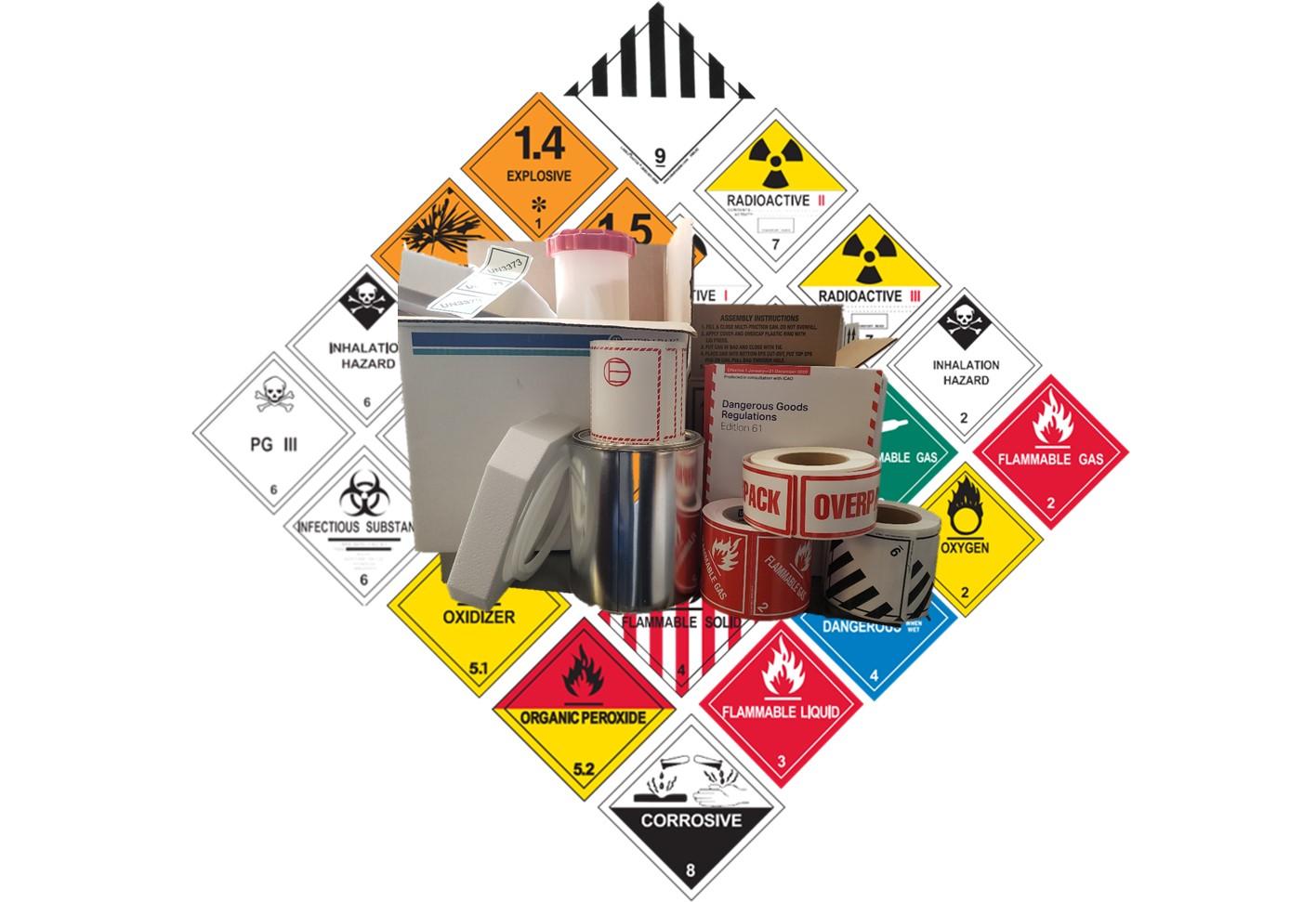
The US Department of Transportation (DOT) and the International Civil Aviation Organization (ICAO) regulate the shipment/transportation of items classified as Hazardous Materials (HM) or Dangerous Goods (DG). Any University faculty, staff, or students needing to ship hazardous materials or dangerous goods must contact the Environmental Health and Safety office (EHS) for assistance.
Important: Failure to meet regulatory requirements when shipping hazardous material or dangerous goods may result in citations, fines, or imprisonment. Fines to the university can range from $250 to $500,000 per violation. Individual researchers and shippers may be subject to criminal penalties of up to $500,000 and five years’ imprisonment.
What is Hazmat / Dangerous Goods?
There are nine categories of hazards used to classify hazardous materials/dangerous goods in transportation. The following are some of the materials commonly shipped from UT classified as HM or DG:
- Chemicals
- Biological materials
- Radioactive materials
- Compressed gases
- Dry ice
- Lithium batteries
Material Transfer Agreement (MTA)
Prior to shipping biological materials, chemical samples, or any research materials to another University/collaborator, an outgoing material transfer agreement (MTA) is required.
Certified Shippers
The regulations for the shipment of hazardous materials or dangerous goods are complex. Only designated University personnel appropriately trained to classify, mark, label, package, prepare and maintain appropriate documentation, in accordance with DOT training requirements as addressed in 49CFR 172.702, may offer hazardous materials or dangerous goods for transportation. EHS maintains staff who possess the required training. Contact EHS if you have any questions.
Required training for certified employees who ship HM or DG:
- OH101 Hazard Communication (online)
- OH102 Hazard Communication (Site-Specific)
- DOT / IATA Shipping Training by approved vendor (Chemical/Biological)
- DOT refresher is required every three years.
- IATA refresher is required every two years.
- Provide training certificate to EHS
- OH605 EHS DOT Seminar
- In-person training, contact EHS
EHS maintains staff who possess the required training.
- DOT refresher training is required every three years.
- IATA refresher training is required every two years.
EHS does provide training for excepted quantities shipping (chemicals), dry ice shipping (only), exempt human/animal specimens shipping. Contact EHS for more information.
Shipping Chemicals / Biologicals
To begin the shipping process, you must complete the Shipping Request Form. Please submit the form at least a week prior to the desired shipping date in order to allow enough time to classify the materials. EHS will determine whether the shipment meets the definition of hazardous materials per the Department of Transportation (DOT) and/or the International Air Transport Association (IATA). Depending upon the classification of the material, additional information may be requested by EHS.
Shipping Radioactive Material
Shipping/transportation of radioactive materials require training and prior authorization by the Radiation Safety Officer (RSO). Contact the EHS radiation safety group or assistance.
Shipping Dry Ice (ONLY)
Dry ice is a hazardous material and is regulated by both the U.S. Department of Transportation (DOT) and the International Air Transport Association (IATA). To package dry ice shipments or to sign any type of shipping documentation (such as an Air Waybill) for a dry ice shipment, you must complete:
- OH101 Hazard Communication (online)
- OH102 Hazard Communication (Site-Specific)
- OH601 Dry Ice Shipper Training
Upon successful completion of these training requirements, EHS will certify you to ship dry ice for a period of 2 years.
*Shipments must NOT contain infectious/pathogenic materials, chemicals (in any amount), tissues, etc. Contact EHS for questions/assistance.*
Non-regulated samples
Shipping request forms (chemical/biological) reviewed by EHS and determined to be non-regulated may be shipped by the lab. This authorization is valid to use for shipments of the material stated, to the same recipient, under the same conditions for up to one year. If any of the conditions change, however, a new approval is needed. Non-regulated materials must be packaged using the triple packaging method.
Receiving Hazardous Package
University employees who only receive delivery of hazardous materials (e.g. administrative and dock personnel) should be able to identify these packages and how to handle damaged/leaking packages. Hazardous materials can be identified in several ways including shipping papers, Safety Data Sheets (SDS) and package markings/labels. The following course should be taken:
- OH101 Hazard Communication (online)
- OH102 Hazard Communication (Site-Specific)
- OH606 Receiving Hazardous Materials
Transporting materials on Campus
Occasionally personnel must transport materials in a vehicle that are classified by the DOT as HM or DG that directly support the university. Hazardous materials must remain in the original shipping package until arriving at the usage or storage location. Unpackaged materials should be transported using the guidelines outlined in the Transporting Hazardous Materials on Campus Standard Operating Procedure. Contact EHS for guidance/assistance for transporting materials off campus.
Only UT-owned vehicles can be used for transporting hazardous materials. Use of a personal vehicle is prohibited. See UTS 157 Automobile Insurance Coverage for Officers and Employees and General Requirements for the Use of Vehicles.
Alternative Courses
Departments/Researchers may also arrange for DOT/IATA training. Consult EHS prior to attending a course to ensure the content will meet the needs of the materials to be shipped.
Shipping Supplies
EHS maintains a small inventory of specialty packaging materials available for purchase. If the required packaging is not available in the inventory, EHS will provide recommendations for acceptable packaging to be purchased by the researcher/personnel.
Vendors: SafTPak, Labelmaster, Berlin Dangerous Goods, Grainger
If you have any questions related to shipping research materials, please send an email to EHS-hazmatshipping@austin.utexas.edu or you may call (512) 232-5125.
